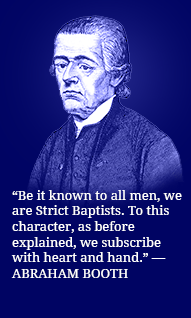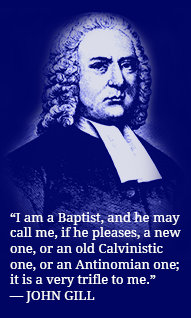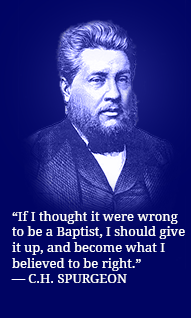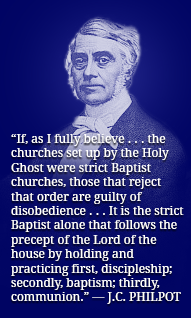Our Perspective on Publishing
. . . that God in all things may be glorified through Jesus Christ, to whom be praise and dominion for ever and ever. Amen." (1 Peter 4:11)
The last fifty years have witnessed a resurgence in publishing and interest relative to the materials and Biblical doctrines which were made prominent during the Reformation and the Puritan eras. Those of us who have been students of the Word of God during these fifty years have been privileged to gain access to many wonderful reprints which have proved to be a great blessing and for which, we shall be ever grateful. However, most of those reprints reflect only the Protestant - Puritan - Paedobaptist Theological perspective. While these publications contain a wealth of solid instruction in many areas, it is apparent that a vast number of readers are not aware that these publications also contain some real problems because they are based upon the inconsistent application of some fundamental Bible principles.
We do not emphasize these problems to exalt ourselves nor to inordinately demean the Protestants but rather our purpose is to focus attention on a fundamental truth that is absolutely essential if anyone is to properly honor the Lord Jesus Christ. This vitally important truth is something that Christians, Pastors, Theologians and the Confessions of Faith of all major evangelical denominations have historically agreed upon, i.e., the wholeness, oneness or connectedness of God's Truth. In the last fifty years many of us have become aware of this "wholeness or oneness" as it applies to the Doctrines of Grace or the Five Points of Calvinism through either reprinted older works which address the subject or through contemporary Protestant writers who have written about it. For example, among contemporary writers, Dr. J. I. Packer, professor of historical and systematic theology at Regent College in Vancouver, British Columbia, has stated, "..the five points [of Calvinism], though separately stated, are really inseparable. They hang together; you cannot reject one point without rejecting them all." Introductory Essay to John Owen's, The Death of Death in the Death of Christ. (Edinburgh: Banner of Truth, 1985), page 6. In an earlier work Dr. Packer again addressed this oneness or connectedness of Divine Truth issue, showing how much further it reaches than just the five points. He wrote, "The New Testament (especially Paul's epistles and John's gospel) presents the saving work of God, not as a series of unconnected actions, but as a single complex operation, the carrying through of a unified composite purpose by the three Persons of the Godhead [working] in conjunction."God's Words: Studies of Key Bible Themes. (Downers Grove, IL: InterVarsity Press, 1981), page 161. Another contemporary writer who has addressed this connectedness of Divine Truth issue is the late Dr. Gordon H. Clark, formerly chairman of the Department of Philosophy at Butler University, who wrote, "It cannot be emphasized too strongly that Christianity is a unified, logical system of doctrine and that the various parts of theology which seem so disconnected are in fact absolutely essential to each other." The Biblical Doctrine of Man. ( Jefferson, MD: The Trinity Foundation, 1984), page 77.
This same fundamental truth regarding the "oneness or connectedness" of the various parts of God's Plan of Redemption was also addressed by many older writers. These older writers opened up the issue further in that they have also shown the importance of knowing about the relationships that exist between various aspects of Biblical doctrines.. For example, in 1879, Dr. A. A. Hodge, professor of exegetical theology at Princeton Theological Seminary, wrote, "God's truth is one, and all the contents of all revelations natural and supernatural must constitute one self-contained system, each part organically related to every other." Again he said, "Since the revelation given in the Scriptures embraces a complete system of truth, every single department must sustain many obvious relations, logical and otherwise, to every other as the several parts of one whole. The imperfect development, and the defective or exaggerated conception of any one doctrine, must inevitably lead to confusion and error throughout the entire system." Outlines Of Theology For Students And Laymen. (Grand Rapids, MI: Zondervan, 1972), pages 22 and 95. A. A. Hodge's father and predecessor at Princeton Seminary, Dr. Charles Hodge, has emphasized the long-range consequences of being ignorant or mistaken about the relationship that exists between the various doctrines of Scripture. He wrote, "If in looking at a complicated machine we are ignorant of the object it is designed to accomplish, or of the relation of its several parts, we must be unable to understand or usefully apply it. In like manner, if we are ignorant of the great end aimed at in the scheme of redemption, or of the relation of the several parts of that scheme; or if we misconceive that end and that relation, all our views must be confused or erroneous. We shall be unable either to exhibit it to others or to apply it to ourselves. . . .The order of the divine decrees, or in other words, the relation in which the several parts of the divine plan stand to each other, is therefore very far from being a matter of idle speculation. It must determine our theology, and our theology determines our religion." Systematic Theology. (Grand Rapids, MI: Wm. B. Eerdmans, 1970), Volume 2, pages 314-315.
So far we have looked mainly at Anglican and Presbyterian authors, i.e., Protestant authors, but it might also be pointed out that many Baptist writers have also addressed these issues. For instance, A. W. Pink stated, "The entire doctrine of Scripture is a perfect and harmonious unit, yet for our clearer apprehension thereof it may be considered distinctively in its component parts. Strictly speaking it is inadmissible to talk of 'the doctrines of grace,' for there is but one grand and Divine doctrine of grace, though that precious doctrine has many facets in it." The Doctrines of Election and Justification. (Grand Rapids, MI: Baker, 1974), page 116. The Old School, Primitive Baptist minister, Dr. John M. Watson elaborated upon this issue in 1867 when he wrote, "The Word of God is such a perfect whole, that we dare not divide it in such a manner as to disconnect one part from another. . . Revealed truths, Christian experience, and practical religion are involved both literally and spiritually in Divine agreement with each other; maintaining, both in the Word of God and in the renewed heart, an inviolable relation to each other - a relation which cannot be broken without perverting the Word of God." The Old Baptist Test or Bible Signs of the Lord's People. (Nashville, TN: Bell, Jones & Co., 1867), page525.
From our studies of the Scriptures themselves and from the evidence given in various testimonies, like the writers just quoted, we believe we are safe to conclude that the Doctrines of God's Word are all part of one consistent, harmonious system. You cannot hold to one doctrine and disparage another! God is one and His truth is one. Hence, the Scriptures speak of "One Gospel" (Galatians 1:6-9), "One Lord, One Faith, and One Baptism" (Ephesians 4:4-5) and they speak of "the Faith" once delivered unto the saints (Jude 3). God's glory is the One supreme purpose, goal and end for everything, (Proverbs 16:4; Romans 11:36). God is especially determined to declare and exhibit "the glory of His grace" (Ephesians 1:1-6) and "the exceeding riches of His grace" (Ephesians 2:1-7). This grace is preeminently set forth "in Christ Jesus" (John 1:16-17; 2 Timothy 1:9) and so Christ is Himself the One preeminent means of bringing honor and glory to God (John 8:49-50; 17:1-4; Philippians 2:11; 1 Peter 4:11). If we would glorify and honor God, we must honor and glorify Christ (John 5:23). Now Christ's glory is supremely set forth in the plan of Salvation, for "His glory is great in thy Salvation" (Psalms 21:5) and thereby "God is glorified in Him" (John 13:31-32). Hence, in declaring and exalting Salvation by Grace, in lifting up the Doctrines of Grace, we honor Christ. To demean, object to and oppose Salvation by Grace is to rob Christ and God of their honor. The connection of the "five points of Calvinism" and the relationship of Salvation by Grace to the Nature of God are some things that most of those who believe in Salvation by Grace understand and acknowledge. Most also understand the cause and effect connection between Salvation by Grace and Good Works. But there are other areas of this "connectedness" of doctrine which are NOT properly recognized and in many cases they are positively and purposely denied and disowned.
The Apostle Paul clearly states that each church, each assembly of the saints (being composed of Divinely prepared materials - those who are saved by Sovereign Grace - and being gathered by the Divine Process of Sovereign Evangelism) is a vehicle or means of bringing "glory to God by Christ Jesus throughout all ages" (Ephesians 3:20-21). Therefore, if we would give proper honor to God, we must give proper honor to Christ, we must give proper honor to Salvation by Grace and proper honor to the Churches of God, wherein Salvation by Grace is being exhibited before the world. These doctrines are all part of one connected system. But we cannot give proper honor to these if we separate the various doctrines one from another. We cannot, we do not give proper honor to "God's plan of Salvation by Grace" if we divest that plan, if we separate that plan from its manifested out-working in calling, conversion, profession of faith, discipleship, church-membership, etc., i.e., "good works & holy living" (Ephesians 1:1-2:22; 1 Thessalonians 1:4-10; 2 Thessalonians 2:13-14; 1 Peter 1:1-2:9). It has been the consistent position affirmed by those who espouse a Believers'-Church that the Doctrine of Salvation and the Doctrine of the Church cannot be contradictory! For example, in 1880, Dr. Howard Osgood of Colgate-Rochester Theological School in Rochester, New York, wrote, "There can be no contradiction between God's doctrines and His precepts. The positive commands of God are - must be - in absolute harmony with His doctrinal truths. There can be no contradiction between His doctrines of salvation and His precepts concerning His churches. . . .One thing is certain, the churches must be, in their origin and continuance, in exact accordance with the Doctrines of God's Grace to man - [because the churches are to be visible manifestations of that saving grace to the world, "the epistles of Christ written with the Spirit of the living God]. If our constitution of a church is scriptural, it will be in harmony with the other doctrines of God's Grace. If it is unscriptural, it will conflict with those doctrines. . . . The Baptists holding, as they do, distinct believer's-church views, are compelled to object most strenuously against the constitution of all Paedobaptist churches, not simply in the interest of the form of baptism, but far more in the interest of the only way of salvation. Paedobaptist churches are, to our view, formed in direct contravention of God's way of salvation; their constitution is at war with the Doctrines of Grace. . . We do not mean to insinuate that we do not believe them Christians. . . But this we say, that while we may highly regard them, we are compelled to bear our testimony - unequivocal and earnest - against what we esteem to be grievous errors against the Doctrines of God." Protestant Paedobaptism And The Doctrine Of The Church. (Philadelphia, PA: American Baptist Publication Society, 1880).
In order to honor the Lord, we must honor that which honors Him. Therefore we need to emphasize the true Nature of God, the Person, Divinity, Covenant Offices, Redemptive Work of the Lord Jesus Christ, the real nature of Salvation by Sovereign Grace, the New Testament churches, Biblical evangelism, the current Eschatalogical Lordship of Jesus Christ over all things, etc., AND the relationships that these doctrines have one with another. If we proclaim Truth, we automatically disclaim Error, hence, we must point out the differences between Baptists and Paedobaptists, for they involve disagreements over these doctrines. Consequently, we are involved in producing several open-end "Series" of Publications. They are basically divided into two groups. Books produced by: (1) Authors who taught Salvation by Grace in doctrine and confirmed it in their Believers'-Church practice and (2) Authors who asserted Salvation by Grace in doctrine but denied it in their Paedobaptist-Church practice. We have divided our publications into these two groups for the sake of clarity and emphasis. We want to focus on both the similarities and dissimilarities of these respective camps. We want to draw attention to those fundamental truths that are the basis for their disagreement and we want people to reflect upon the tragic situation that exists today wherein many professing Christians are prone to think that the doctrines and practices about which these two camps disagree are secondary issues. As a result of this type of thinking, many professing Christians are indifferent to these truths or they are misled to think it is honoring to God and Salvation by Grace, that they are doing God a service, when they downplay the practical outworking of God's Saving Grace especially as it is manifested in obedience to Christ's commanded Gospel Church-Order.
For well over a century, because of misguided desires for and efforts toward the ecumenical union of all religions and because of, what one author recently called, "the curiosities, idiosyncrasies and exaggerations of a hyper-critical age" Believers'-Church Distinctives have been unduly criticized, downplayed and neglected in many modern, progressive New School Baptist churches, associations, conventions, denominational bureaucracies, colleges and especially seminaries. The Sovereignty of God, the real nature of Salvation by Grace and its practical outworking in discipleship and autonomous God-honoring churches have all been neglected, ridiculed or denied. But these are the things that honor God and He has said Himself, "them that honor Me, I will honor." (1 Samuel 2:30). Consequently, is it any wonder that they find themselves rent asunder by disagreements over doctrine, experience and practice. It should not be counted a strange thing that their members have no real agreement or appreciation for their own doctrines, history and heritage, or that they suffer from an "identity crisis" or a loss of purpose and mission. "Can two walk together except they be agreed?" (Amos 3:3). "If the foundations be destroyed, what can the righteous do?" (Psalms 11:3). If we have "sown to the wind" shall we not expect to reap "a whirlwind"? (Hosea 8:7).
It would be negligent on our part if we failed to point out that during these same fifty years, despite this unbiblical criticism, the Lord has providentially raised up some new people and stirred up some older ones, who have begun to reconsider what the Scriptures really teach about Salvation. It is sincerely hoped that this resurgence will not stop short but go on to consider the work of God in the souls of His people in all of its various aspects, not only its Origin and Nature but its practical out-working as well; not just the connection between the Nature of God (Theology Proper) and the Nature of Salvation (Soteriology) - vitally important as these things are - but also how Soteriology is inseparably connected with Ecclesiology (the Nature of the Church) and also with Eschatology (the Nature of the Last Things) as well.
Under the Lord's blessing, we believe that the Truths contained in our publications will help re-focus attention upon these important issues. We believe the publications we distribute will help promote study and discussion, will dispel darkness and overcome prejudice, will raise again those vitally important distinctive doctrinal walls that have been broken down, will help lay again the foundation for real unity among the People of God (which can only be based upon agreement in the Truth) and will ultimately, in the end, bring "glory to God in the church by Christ Jesus" (Ephesians 3:21). It our belief that God, Christ and Salvation by Sovereign Grace are to be honored. But we believe these cannot be honored properly, in a thorough way, without honoring all aspects of the Divine Plan of Salvation. We cannot honor God by neglecting those aspects of His Truth that are unpopular, inconvenient or distasteful to us. It is believing and proclaiming the whole counsel of God that honors Him and benefits His people. We cannot honor God by neglecting or denying the Biblical Doctrine of the New Testament Church or by espousing a view of the churches that conflicts with Salvation by Sovereign Grace. These two doctrines are not and can not contradict each other. We cannot honor God or Christ by refusing to confront false doctrine about the churches or by compromising with them. Real progress is never promoted by compromise with error.
Abraham Booth once wrote, "If Error be harmless, then Truth must needs be useless." A generation later J. M. Pendleton wrote, "Error can never be harmless. . . There is no advantage in error. So far from it, it is mischievious, hurtful and pernicious." It is from this perspective that we approach our publishing work and prayerfully send forth our various republications.






